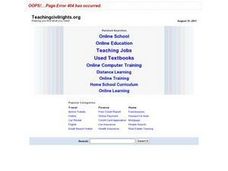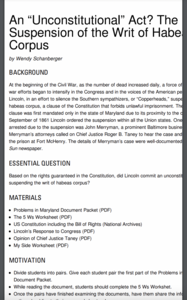Curated OER
"I have a Dream"
Students analyze the famous "I Have a Dream," speech by Martin Luther King Jr., and discuss the progress made since then. In small groups, they read and discuss various documents, and formulate a plan of action to help realize Dr. King's...
Library of Virginia
Antebellum Freedom
From indentured servitude to involuntary race-based servitude, slavery has taken many forms in American history. Class members examine three manumission petitions that reveal how the rights of African Americans and African American...
National Endowment for the Humanities
A Raisin in the Sun: Whose "American Dream"?
How does Lorraine Hansberry's A Raisin in the Sun factor into a discussion of the American dream? High schoolers define the American dream and recognize the historical setting of the play. Additionally, they identify forms of...
Curated OER
Rationalizing Race in US History
Students consider the classification of people. In this race studies lesson, students examine the concept of race as it relates to U.S. history and trends. Students research racial discrimination and prejudice in order to support their...
Curated OER
Looking for Heroes
Pupils explain the importance of the 1965 Selma-to-Montgomery Voting Rights March and the long term impact in the US of non violent civic participation.
Curated OER
African Americans in the Maritime Trades
Students explore Civil Rights by analyzing U.S. history. In this African American workforce lesson plan, students discuss the history of African Americans in Baltimore and the need for steady work that formed. Students define vocabulary...
University of California
Anti-Communism at Home
Have you ever been accused of something without cause? The sixth installment of an eight-part series asks scholars to create a museum exhibit on the anti-communist activities in the United States at the start of the Cold War. To make...
Curated OER
Court Documents Related to Martin Luther King, Jr., and Memphis Sanitation Workers
Young scholars read about the civil rights movement in their textbooks. They engage in a whole-class discussion of how nonviolent direct action can be a powerful tool for bringing about social, economic, or political change.
Curated OER
Constitutional Resources
Pupils explore the REpublican Era and the writing of the constitution and Billof Rights through various links and activities included in this collection.
Curated OER
A Lesson on Reconstruction Legislation and Amendments
Young scholars study the legislation and Amendments of Reconstruction period in America. In this Reconstruction lesson, students work in groups to dissect the Black Codes, an article in the US Constitution, as well as the 13th, 14th, and...
Center for History Education
The Freedmen's Bureau: Success or Failure?
What is freedom? The United States grappled with the question at the end of the Civil War after four million enslaved people were freed. Using circulars and images from the Reconstruction period, individuals examine how successful the...
Curated OER
Priorities and Power: Migrants and Voting
Students examine the African-American migrants entry into the political process. They summarize their findings in a short essay.
Curated OER
An Act of Courage, The Arrest Records of Rosa Parks
Students research accounts on Rosa Parks and look for differences between the modern form and an older report on Parks. They discuss why information about race and nationality are collected on these and other forms.
Stanford University
Reconstruction Structured Academic Controversy (SAC)
Young scholars debate whether African Americans were free during Reconstruction. In this debate instructional activity, students use primary documents to support their argument as to whether African American were free during the...
Atlanta History Center
What if YOU Lived During Jim Crow?
Young historians envision what life was like for African Americans living in the Jim Crow South through hands-on, experiential activities.
PBS
The Sixties: Dylan Plugs in and Sells Out
Before Woodstock, there was Newport. Get plugged in to the social changes of the 1960s with a lesson that looks at Bob Dylan's performance at the 1965 Newport Folk Festival as a symbol of the radical changes that marked the era.
Curated OER
"The New Television Set" a Gateway to the Post World War II Era
Eleventh graders demonstrate their knowledge of the effects of television on the political, economic, religious, social, intellectual and artistic life of the US nation from the 1950's. Research how television shaped public opinion with...
Curated OER
An "Unconstitutional" Act? The Suspension of the Writ of Habeas Corpus
Young scholars explore the implications of habeas corpus. In this Civil War lesson, students analyze the writ of habeas corpus by Lincoln during the war. Young scholars examine primary sources from Lincoln and Chief Justice Taney....
Curated OER
Jazz in America
Pupils explore the Jazz of today and its future. They answer questions and listen to music.
Curated OER
Segregated America
Students investigate Jim Crow laws. In this segregation lesson, students analyze images that display American segregation. Students use the provided questions to aid them in their evaluation of the images.
Rutgers University
African-Americans in WWII
Using transcripts of interviews of African-Americans who served in WWII, class members work in pairs to understand their experience. Prior to the group work, the teacher provides background on WWII and the African-American experience....
Curated OER
Why Was It Difficult To "reconstruct the South"?
Learners examine problems faced by the states of the Confederacy following the Civil war. They predict how Lincoln wanted to handle the problem of reconstruction by listening to his words. They describe conditions in the South...
Curated OER
Diverse Voices - African American Ventures
Students research African American history and the Underground Railroad. In this African American history lesson, students discuss the Drinking Gourd. Students read 'If You Traveled the Underground Railroad' and discuss. Students work in...
C-SPAN
14th Amendment Equal Protection Clause
Two Supreme Court cases, Plessy v. Ferguson and Brown v. Board of Education take center stage in a lesson about the Equal Protection Clause of the 14th Amendment. Class members research both cases to compare and contrast the rulings.

























